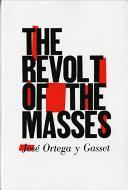Quotes from book
The Revolt of the Masses

The Revolt of the Masses is a book by José Ortega y Gasset. It was first published as a series of articles in the newspaper El Sol in 1929, and as a book in 1930; the English translation, first published two years later, was authorized by Ortega. While the published version notes that the translator requested to remain anonymous, more recent editions also record that its US copyright was renewed in 1960 by a Teresa Carey, and the US Copyright Office's published list of US copyright renewals for January 1960 gives the translator as J. R. Carey.

Source: The Revolt of the Masses (1929), Chapter XIV: Who Rules The World?
Context: Greeks and Latins appear in history lodged, like bees in their hives, within cities, poleis. … The polis is not primarily a collection of habitable dwellings, but a meeting-place for citizens, a space set apart for public functions. The city is not built, as is the cottage or the domus, to shelter from the weather and to propagate the species — these are personal, family concerns — but in order to discuss public affairs. … The man of the fields is still a sort of vegetable. His existence, all that he feels, thinks, wishes for, preserves the listless drowsiness in which the plant lives. The great civilisations of Asia and Africa were, from this point of view, huge anthropomorphic vegetations. …Socrates, the great townsman, quintessence of the spirit of the polis, can say: "I have nothing to do with the trees of the field, I have to do only with the man of the city." What has ever been known of this by the Hindu, the Persian, the Chinese, or the Egyptian?